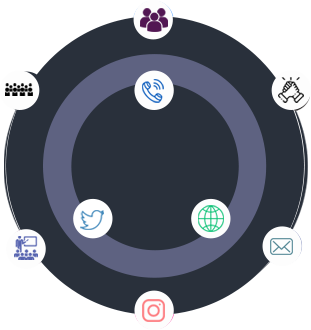
Mastering Emotional Intelligence for Effective Communication
-
Training TypeLive Training
-
CategoryCommunications
-
Duration4 Hours
-
Rating4.9/5

Course Introduction
About the Course
Emotional Intelligence and Communication Skills are essential tools for building meaningful connections, navigating complex social dynamics, and fostering personal and professional success. Emotional Intelligence (EI) refers to the ability to recognize, understand, and manage our own emotions, as well as the ability to recognize and influence the emotions of others. It encompasses five key components: self-awareness, self-regulation, motivation, empathy, and social skills, all of which play a critical role in effective communication.
When combined, emotional intelligence and communication skills enable individuals to express themselves clearly, manage conflict constructively, and respond empathetically in diverse situations. People with strong EI can read non-verbal cues, listen actively, and engage in conversations with sensitivity, which fosters trust and collaboration. This ability is especially important in professional environments, where emotional intelligence can enhance teamwork, leadership, and customer relations.
Effective communication, on the other hand, is the foundation for success in every relationship. Whether in the workplace, at home, or in social settings, the ability to articulate thoughts clearly, listen attentively, and adapt to others' emotional states is crucial. By mastering both emotional intelligence and communication skills, individuals can navigate difficult conversations with ease, build strong relationships, and create positive, supportive environments for growth and collaboration.
Course Objective
Develop Self-Awareness – Help individuals recognize and understand their own emotions, triggers, and biases, enabling them to communicate more effectively and respond with greater emotional clarity.
Enhance Emotional Regulation – Equip individuals with the tools and techniques needed to manage their emotions, especially in high-pressure or challenging situations, ensuring more composed and constructive conversations.
Improve Empathy and Active Listening – Teach the importance of understanding others' emotions, listening actively, and responding empathetically to build stronger, trust-based relationships.
Strengthen Interpersonal Communication Skills – Enable individuals to communicate more clearly, confidently, and consistently while adapting to different communication styles and personalities.
Overcome Communication Barriers – Identify common barriers to effective communication, such as biases, distractions, and assumptions, and provide strategies to navigate and overcome these obstacles in both personal and professional settings.
Master Assertive Communication – Help individuals distinguish between assertive, aggressive, and passive communication, promoting the ability to express needs, set boundaries, and stand up for oneself respectfully and with empathy.
Apply EI in Team and Leadership Communication – Provide techniques for using emotional intelligence to build collaborative teams, manage conflicts, and inspire others through emotionally intelligent leadership and communication.
Optimize Digital Communication – Offer strategies for maintaining emotional intelligence and clear communication in virtual and digital communication platforms, reducing the likelihood of miscommunication.
Foster Lifelong Emotional Intelligence Growth – Encourage daily habits, feedback practices, and lifelong learning to continually enhance emotional intelligence and communication skills over time, ensuring sustained personal and professional success.
Strengthen Communication in Personal Relationships – Provide strategies to improve communication with spouses, children, and family members by fostering empathy, setting healthy boundaries, and modeling emotionally intelligent behaviors.
Who is the Target Audience?
Professionals and Leaders – Individuals in leadership or management roles who seek to enhance their communication with teams, clients, and colleagues, foster collaboration, and resolve conflicts effectively.
Human Resources (HR) Personnel – HR professionals who aim to build emotionally intelligent work environments, improve employee engagement, and resolve interpersonal issues within organizations.
Entrepreneurs and Business Owners – Business leaders and entrepreneurs looking to enhance their communication with clients, partners, and employees to drive business success and build long-term relationships.
Students and Early Career Professionals – Individuals starting their professional journey who want to develop strong communication skills and emotional intelligence for career growth and workplace success.
Teachers and Educators – Teachers who seek to better understand their students’ emotional needs, improve classroom communication, and create an emotionally supportive learning environment.
Couples and Parents – Individuals in relationships who wish to strengthen their communication with partners and children through empathy, active listening, and emotional awareness.
Anyone Interested in Personal Growth – Individuals seeking to improve their interpersonal skills, manage emotions better, and build stronger, more meaningful relationships in both personal and professional contexts.
Basic Knowledge
Willingness to Learn and Self-Reflect
Readers should have an open mind and a genuine desire to improve their emotional intelligence and communication skills.
A readiness to reflect on personal emotions, behaviors, and communication patterns is essential for growth.
Basic Communication Skills
A foundational understanding of verbal and non-verbal communication will help readers grasp more advanced concepts discussed in the book.
Commitment to Practice
Developing emotional intelligence and effective communication requires consistent practice. Readers should be prepared to apply the exercises and strategies provided in real-life situations.
Desire for Personal and Professional Growth
The book is ideal for those who are motivated to strengthen their relationships, resolve conflicts, and achieve personal or professional success through improved emotional intelligence and communication.
Open to Feedback
A willingness to accept and learn from constructive feedback is essential for making meaningful changes in behavior and communication style.
Basic Technological Proficiency (Optional)
For readers interested in the digital communication chapters, familiarity with using tools like emails, messaging platforms, and video conferencing will enhance their learning experience.
These prerequisites are not mandatory but will provide a strong foundation for readers to effectively engage with and benefit from the book’s content.
Available Batches
Pricing
Require a Different Batch?
Request a Batch For


